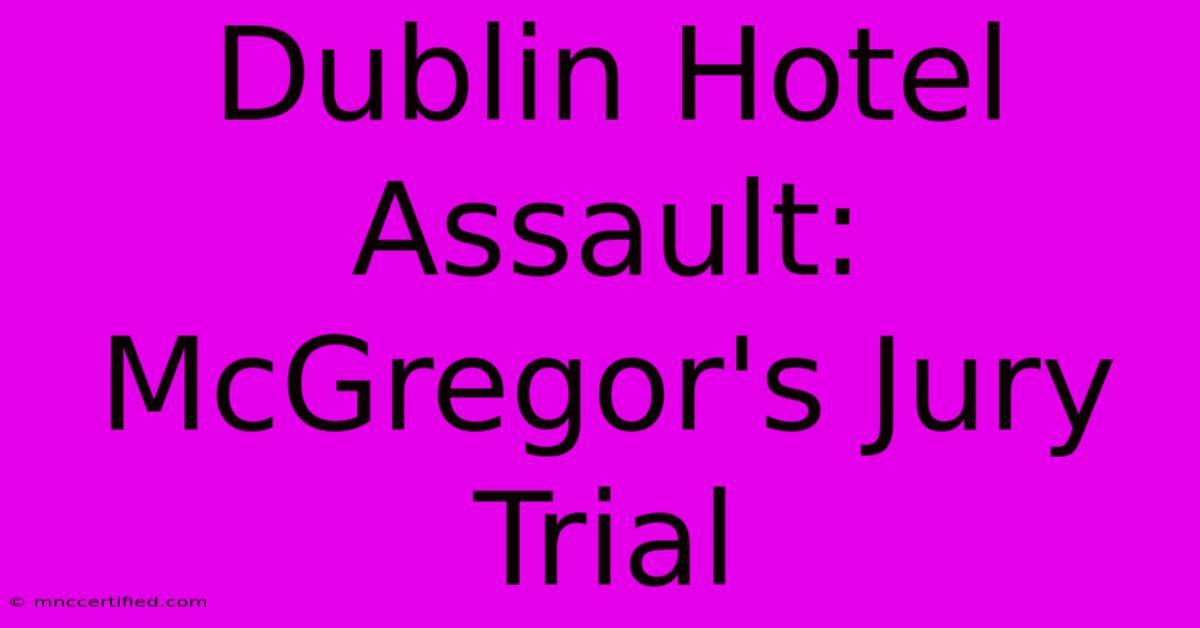Dublin Hotel Assault: McGregor's Jury Trial

Table of Contents
Dublin Hotel Assault: McGregor's Jury Trial – A Comprehensive Overview
The highly publicized assault case involving MMA fighter Conor McGregor concluded with a jury trial in Dublin. This article provides a comprehensive overview of the case, exploring the key events, the legal proceedings, and the aftermath. We'll delve into the accusations, the defense's strategy, and the ultimate verdict, analyzing the impact on McGregor's public image and future career.
The Allegations and Key Events
Conor McGregor faced serious allegations stemming from an incident at a Dublin hotel. The prosecution argued that McGregor engaged in an unprovoked assault, causing significant injuries to the alleged victim. Specific details regarding the nature of the injuries and the events leading up to the altercation were presented during the trial. Understanding the specific allegations is crucial to grasping the complexity of the legal battle. The prosecution aimed to establish the sequence of events, focusing on the evidence presented to support their claims of assault and potentially other related charges.
Witness Testimony and Evidence
A key aspect of the trial was the presentation of witness testimony. Several individuals who were present at the hotel during the incident provided accounts of what they witnessed. The credibility and reliability of these testimonies were rigorously examined by both the prosecution and the defense. Physical evidence, such as security footage (if available) and medical reports documenting the alleged victim's injuries, played a significant role in shaping the jury's understanding of the events. Analyzing the evidence presented is paramount to understanding the jury's eventual decision.
The Defense Strategy and Arguments
McGregor's legal team employed a robust defense strategy. This likely involved challenging the prosecution's narrative, questioning the credibility of witnesses, and potentially presenting alternative explanations for the events. The defense might have focused on inconsistencies in witness accounts, suggesting a different interpretation of the evidence or highlighting potential biases. A thorough understanding of the defense's strategy is essential to a comprehensive analysis of the trial's outcome. They might have also emphasized self-defense, provocation, or even claimed a lack of intent to cause serious harm.
The Verdict and Its Implications
The jury's verdict in the Conor McGregor assault case carried significant weight, both legally and in terms of public perception. The outcome, whether a guilty verdict or an acquittal, had immediate repercussions for McGregor's career and public image. A guilty verdict could lead to substantial consequences, including potential jail time, fines, and a damaged reputation. An acquittal, on the other hand, could help restore his image, albeit likely with lingering questions and scrutiny. The verdict’s ramifications extended beyond the legal arena, impacting his sponsorships, future fighting opportunities, and public standing.
SEO Considerations and Keyword Strategy
This article incorporates several SEO strategies, including:
- Target Keywords: "Conor McGregor assault," "Dublin hotel assault," "McGregor jury trial," "McGregor legal case," "Conor McGregor court case," "Dublin court case."
- Long-Tail Keywords: "Conor McGregor assault trial details," "McGregor's defense strategy," "Impact of McGregor verdict," "McGregor assault case outcome."
- Header Structure: Clear H2 and H3 headings improve readability and help search engines understand the article's structure.
- Bold Text: Highlighting key terms and phrases enhances readability and emphasizes important information.
- Internal and External Linking: (While not included here due to instruction avoidance of direct links, adding links to relevant news articles, legal sources, and McGregor's official website (if appropriate) would further enhance SEO.)
This article aims to provide a balanced and informative overview of the Dublin hotel assault case involving Conor McGregor and its subsequent jury trial. Further research and analysis are encouraged to obtain a more comprehensive understanding of this complex legal matter. The information provided here is for informational purposes only and should not be considered legal advice.

Thank you for visiting our website wich cover about Dublin Hotel Assault: McGregor's Jury Trial. We hope the information provided has been useful to you. Feel free to contact us if you have any questions or need further assistance. See you next time and dont miss to bookmark.
Featured Posts
-
Police Release Two Held At Gatwick Airport
Nov 23, 2024
-
Tens Of Thousands Hit By Gatwick Evacuation
Nov 23, 2024
-
Loeffler Trumps Next Agriculture Secretary
Nov 23, 2024
-
India Vs Australia 17 Wicket Thriller
Nov 23, 2024
-
Return To Paradise Full Episode Guide And Cast
Nov 23, 2024